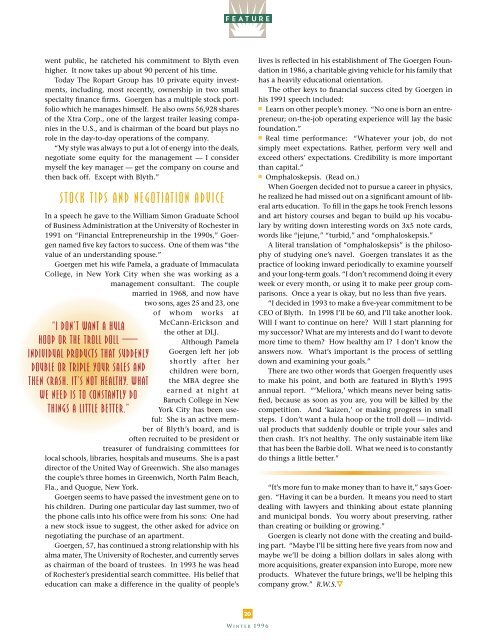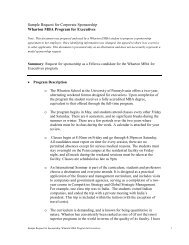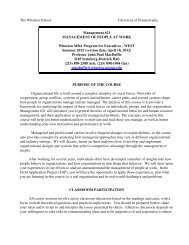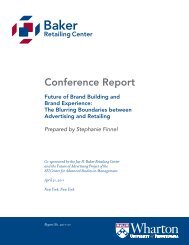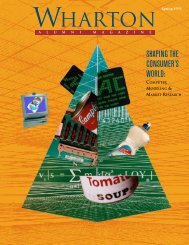wharton's prescription for health care - Wharton Magazine
wharton's prescription for health care - Wharton Magazine
wharton's prescription for health care - Wharton Magazine
Create successful ePaper yourself
Turn your PDF publications into a flip-book with our unique Google optimized e-Paper software.
FEATUREwent public, he ratcheted his commitment to Blyth evenhigher. It now takes up about 90 percent of his time.Today The Ropart Group has 10 private equity investments,including, most recently, ownership in two smallspecialty finance firms. Goergen has a multiple stock portfoliowhich he manages himself. He also owns 56,928 sharesof the Xtra Corp., one of the largest trailer leasing companiesin the U.S., and is chairman of the board but plays norole in the day-to-day operations of the company.“My style was always to put a lot of energy into the deals,negotiate some equity <strong>for</strong> the management — I considermyself the key manager — get the company on course andthen back off. Except with Blyth.”STOCK TIPS AND NEGOTIATION ADVICEIn a speech he gave to the William Simon Graduate Schoolof Business Administration at the University of Rochester in1991 on “Financial Entrepreneurship in the 1990s,” Goergennamed five key factors to success. One of them was “thevalue of an understanding spouse.”Goergen met his wife Pamela, a graduate of ImmaculataCollege, in New York City when she was working as amanagement consultant. The couplemarried in 1968, and now havetwo sons, ages 25 and 23, oneof whom works at“I DON’T WANT A HULAHOOP OR THE TROLL DOLL —INDIVIDUAL PRODUCTS THAT SUDDENLYDOUBLE OR TRIPLE YOUR SALES ANDTHEN CRASH. IT’S NOT HEALTHY. WHATWE NEED IS TO CONSTANTLY DOTHINGS A LITTLE BETTER.”McCann-Erickson andthe other at DLJ.Although PamelaGoergen left her jobshortly after herchildren were born,the MBA degree sheearned at night atBaruch College in NewYork City has been useful:She is an active memberof Blyth’s board, and isoften recruited to be president ortreasurer of fundraising committees <strong>for</strong>local schools, libraries, hospitals and museums. She is a pastdirector of the United Way of Greenwich. She also managesthe couple’s three homes in Greenwich, North Palm Beach,Fla., and Quogue, New York.Goergen seems to have passed the investment gene on tohis children. During one particular day last summer, two ofthe phone calls into his office were from his sons: One hada new stock issue to suggest, the other asked <strong>for</strong> advice onnegotiating the purchase of an apartment.Goergen, 57, has continued a strong relationship with hisalma mater, The University of Rochester, and currently servesas chairman of the board of trustees. In 1993 he was headof Rochester’s presidential search committee. His belief thateducation can make a difference in the quality of people’slives is reflected in his establishment of The Goergen Foundationin 1986, a charitable giving vehicle <strong>for</strong> his family thathas a heavily educational orientation.The other keys to financial success cited by Goergen inhis 1991 speech included:■ Learn on other people’s money. “No one is born an entrepreneur;on-the-job operating experience will lay the basicfoundation.”■ Real time per<strong>for</strong>mance: “Whatever your job, do notsimply meet expectations. Rather, per<strong>for</strong>m very well andexceed others’ expectations. Credibility is more importantthan capital.”■ Omphaloskepsis. (Read on.)When Goergen decided not to pursue a <strong>care</strong>er in physics,he realized he had missed out on a significant amount of liberalarts education. To fill in the gaps he took French lessonsand art history courses and began to build up his vocabularyby writing down interesting words on 3x5 note cards,words like “jejune,” “turbid,” and “omphaloskepsis.”A literal translation of “omphaloskepsis” is the philosophyof studying one’s navel. Goergen translates it as thepractice of looking inward periodically to examine yourselfand your long-term goals. “I don’t recommend doing it everyweek or every month, or using it to make peer group comparisons.Once a year is okay, but no less than five years.“I decided in 1993 to make a five-year commitment to beCEO of Blyth. In 1998 I’ll be 60, and I’ll take another look.Will I want to continue on here? Will I start planning <strong>for</strong>my successor? What are my interests and do I want to devotemore time to them? How <strong>health</strong>y am I? I don’t know theanswers now. What’s important is the process of settlingdown and examining your goals.”There are two other words that Goergen frequently usesto make his point, and both are featured in Blyth’s 1995annual report. “‘Meliora,’ which means never being satisfied,because as soon as you are, you will be killed by thecompetition. And ‘kaizen,’ or making progress in smallsteps. I don’t want a hula hoop or the troll doll — individualproducts that suddenly double or triple your sales andthen crash. It’s not <strong>health</strong>y. The only sustainable item likethat has been the Barbie doll. What we need is to constantlydo things a little better.”“It’s more fun to make money than to have it,” says Goergen.“Having it can be a burden. It means you need to startdealing with lawyers and thinking about estate planningand municipal bonds. You worry about preserving, ratherthan creating or building or growing.”Goergen is clearly not done with the creating and buildingpart. “Maybe I’ll be sitting here five years from now andmaybe we’ll be doing a billion dollars in sales along withmore acquisitions, greater expansion into Europe, more newproducts. Whatever the future brings, we’ll be helping thiscompany grow.” R.W.S.”20W INTER 1996


